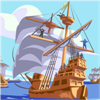 WebQuest
WebQuest
The purpose for this module is two-fold: 1) Learning how to create a website and web pages through the development of a WebQuest, and 2) Getting to Know "WebQuest" (what it is?, why we make it?, and how to make it?)
What is a WebQuest?
A WebQuest is a lesson format that employs project-based approach, problem-based approach, and inquiry-oriented approach in which most or all the information that learners work with comes from the web.
WebQuests are among the most fascinating applications on the Internet for K-12 educators. Student centered and inquiry based, a WebQuest challenges students to explore the web for information and it is an excellent way to integrate the Internet into the classroom. Traditionally WebQuests have an introduction, a process, a task, a list of resources, a conclusion, and an evaluation. Bernie Dodge and Tom developed the WebQuest model in early 1995 at San Diego State University March. Bernie Dodge's WebQuest Page
About the WebQuest Approaches
Project-based learning, problem-based learning, and inquiry-based learning all three closely relate to the information processing approach. They all fit well with technology-rich learning environments where the focus is not on the hardware and software, but on the learning experience. In each case, technology is used to facilitate learning. It may be a tool to organize ideas (such as Inspiration), search for current information (such as an online news source), or present ideas (such as PowerPoint presentations). However the focus of learning environment is the student's excitement about solving a problem or addressing an issue they find meaningful.
Resources
- WebQuest (A means to empower learners using IT resources)
- Some Thoughts About WebQuests
- Useful WebQuest Resources
- Basic Form of WebQuest
- Take Me Out to the Ball Game
- Be WWW Safe
- Why Constructing a WebQuest?
- Why WebQuest?
- New York City WebQuest
- WebQuest Examples:
- More Examples from WebQuest Database (Search)
For a more complete description of each component go to Building Blocks of a WebQuest by San Diego City Schools Ed Tech Dept.
Module Activity
My Lesson WebQuest
Reviewing the resources provided above, you are to create a WebQuest to teach your lesson plan topic. Your complete project must be saved on your website (W:). Your WebQuest must also comprise both Student Page and Teacher Page with all components included.
WebQuest Templates
- WebQuest.zip (Updated and Revised for this class)
* To use this, download the zipped file and extract it to your class folder in W: drive. - Other templates from WebQuest.org (Scroll down to the end of the page)
Note: It is NOT required that you to use the class template. You are free to use any template or be creative designing your own layout.
Important: Successful WebQuest should follow the requirements below:
- WebQuest Project Requirements and Criteria
- Additional Reseources for WebQuest Design (see below)
Additional Resources for Your WebQuest Design
Copyright Note
You must adhere to the terms of use for each web site in order to use their images in your project. You may not use any images under the terms of fair use. because your web site will be distributed to a wide audience on an open network (the WWW). Fair use does not apply under these circumstances.
Color Selection
- Color Schemer Online (select a color and it generates 15 harmonious colors)
- Color Scheme Designer (select a color and a color scheme such as complement or triad based on the color wheel)
- Color Palette Generator (suggests a color scheme based on an image URL)
- Palette Man (preview color schemes comprised of up to 5 colors)
Imagery
- Pics4Learning
- Flickr - Creative Commons
- Flickr - Library of Congress
- Flickr - The Commons
- Wikimedia Commons (see reusing content outside wikimedia)
- MorgueFile (free high-resolution photos & images organized by category)
- Stock.Xchng (more than 150,000 photos)
- 4FreePhotos (high quality stock images, public domain)
- Library of Congress (you might also check out the LOC Teachers page)
Non-Internet Media Resources
- AEA267 Educational Resources (click "Get Media" link in menu)
You may also visit AEA267 on Cedar Heights Rd in Cedar Falls. Present your UNI student ID for a visitor's card to access AEA267 materials. - Google Book Search (limited previews and availability at local libraries)
Rubric Generators
While a rubric is not required for the evaluation page, these provide relatively easy ways to generate an evaluation rubric.